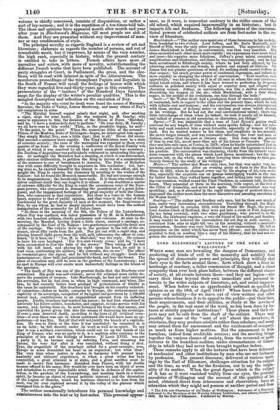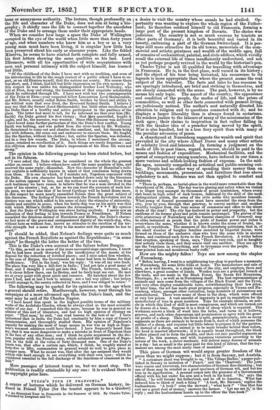LORD ELLESMERE'S LECTURE ON THE DUKE OE WELLINGTON. * WHILE some
men are bewailing the dangers of Democracy, and predicting all kinds of evil to the monarchy and nobilityfrom the spread of democratic power and principles, they wilfully shut their eyes to the facts around them; facts which show a freer in- terchange of courtesy, a fuller communion of thought, and a closer sympathy than ever took place before, between the different classes of society, at all events between those—and they are legion—who carry their ideas beyond their own immediate- personal in- terests to the wider subjects of literature, art, ad social improve- ment. When before was an apprehended outbreak so quelled by opinion as on the 10th of April 1848 ? When have the dignified clergy and nobility—for we leave out of view, writers and other persons whose business it is to appeal to the public—put their time, their acquirements, and their abilities, so freely at the service of the people, in the real sense of the word, as has been done by lec- tures at strictly popular institutions ? These places and their ob- jects may not be safe from the shaft of the satirist. There may possibly be some of the "cant of wit" about the members ; in strictness, they may produce sciolists rather than scholars; and many may attend them for amusement and the excitement of company, as much as from higher motives. ]3ut the amusement is from harmless, indeed from creditable sources ; and the meeting.brings together the various classes of society, from the reverend or noble lecturer to the humblest auditor, under circumstances of fellow- ship in which they had never been brought together before. These remarks apply to all the lectures that have been delivered at mechanics' and .other institutions by men who are not lecturers by profession. The present discourse, delivered at various meet- ings by the Earl of Ellesmere, challenges attention for its subject and the time, as well as for the freshness, not to say the 04111" ality of its matter. When the great figure which is the subject of it has as it were vanished visibly from our eyes, the personal anecdotes of Wellington and the account of the qualities of his mind, obtained direct from intercourse and observation have all attraction which they might not possess at another period from • The Life and Character of thelbuke of Wellington. Substance of a Discourse delivered to the Members of the Worsley Library Institution, and others, October 14, 102. By the Earl of Ellesmere. Pubhshed by Murray. loose or anonymous authority. The lecture, though professedly on the life and character of the Duke, does not aim at being a bio- graphy; it chiefly uses the life to connect together the anecdotes of the Duke and to arrange them under their appropriate heads. When we consider how large a space the Duke of Wellington occupied in the eye of the world when little more than forty years of age, and when numbers who knew him as a boy or as a very young man must have been living, it is singular how little has been preserved about his early or obscurer years. Like the fabled Minerva, he seems to have started forth complete and fully armed, his first letters showing the same qualities as his last. Lord Ellesmere, with all his opportunities of wide acquaintance with men and personal intimacy with the subject himself, has learned but little.
"Of the childhood of the Duke I have met with no tradition and even of his introduction to life in the rough contact of a public school I have to re- gret, as an old Etonian myself, that the notices are scanty. His course there was short, and, I think, had left but little impression on his own memory. In this res_pect he was unlike his distinguished brother Lord Wellesley, who laid at Eton, deep and strong, the foundations of that exquisite scholarship which he cultivated through life. I have met with but two contemporaries of the Duke at Eton—your respected fellow Lancastrian Lord Skelmersdale, and Mr. Robert, usually called Bobus Smith, brother by blood and ability to the wittiest man that ever lived, the Reverend Sydney Smith. I believe I may say that the former (Lord Skelmersdale) has little other recollection of the Duke than of a healthy and active participator in the pastimes of the place. The latter had more to tell, for he informed me that over him (Mr. Smith) the Duke gained his first victory ; thattireyquarrelled, fought it ought, and he, the narrator, was worsted. Since this discourse was delivered I have heard some further particulars of this the Duke's first conflict. Young Smith was bathing, and was pelted from the river-bank by Mr. Wellesley. He threatened to come out and chastise the assailant, and, his threats being met with defiance, did come out and endeavour to execute them. He fought, like the Spartan, without his clothes ; but, unlike the Spartan, was defeated, and in a very few rounds. The Duke, to whom I mentioned the circum- stance, retained no recollection of it. Such things are rarely forgotten; and this oblivion shows that the Duke's impressions of his Eton life were not strong."
The opinion in the following passage has been stated before, but not in its fulness.
"I once asked the Duke whom he considered on the whole the *reatest soldier on record. I believe others have asked the same question of him, and received the same reply—Hannibal. Now the character of Hannibars mili- tary exploits is sufficiently known to admit of that conclusion being drawn from them. It is one in which, if I mistake not, Napoleon concurred with the Duke. His own character has been handed down only by the literature of the nation opposed to him, and the notices of it are scanty. Even from such testimony we have reason to believe that he was a man devoted to the cause of his country but, so far as we can trust the accounts of such hos- tile pens, we know also that if he loved Carthage well he hated Rome more. In this respect he more nearly resembled Nelson than the great subject of this discourse. The feeling of Nelson towards the French Revolution and its abettors was one which added to his sense of duty the stimulus of animosity. Gentle and amiable in peace, when his battle-flag was up his spirit was that with which Milton's Griffin pursues the Arimaspian. * * * * My opinion is, that the Duke of Wellington was above hating anybody. I never saw an indication of that feeling in him towards France or Frenchmen. If Nelson resembled the fabulous animal of Herodotus and Milton, the Duke's charac- ter had more of the grave and unimpassioned dignity of the watch-dog, who, without hate as without fear, knows no stimulus to the exertion of his ter- rible strength but a sense of duty to his master and the premises he has to guard."
It should be added, that Nelson's feelings were quite as much against the French Royalists as against the Republicans; "in some points" he thought the latter the better of the two. This is the Duke's own account of the failure before Burgos.
"In this, as well as in some of his more successful siege operations, I knew that he had been much thwarted by the insufficiency of the means at his disposal for the reduction of fortified places ; and I once asked him whether, in the ease of Burgos, the Government at home had been to blame for that insufficiency. Not in the least,' was his reply: it was all my own fault. The place was very like a hill-fort in India ; I had got into a good many of these, and I thought I could get into this. The French, however, had a d—h clever fellow there, one Le Breton, and he fairly kept me out. He met me at every point with great spirit and resource. He knocked about the few guns I had, and at last I took to mining : not a bad way either' but before I could manage it, the enemy collected in force, and I was obliged to retire.'" The following may be quoted for its opinion as to the age when a general should retire. Marlborough, however, went through his campaigns at a more advanced age than the Duke's limit, and the same may be said of Sir Charles Napier. "I have heard him speak in the highest possible terms of the military works of the Archduke Charles, whom he always cited as the most scientific soldier of our day. I remarked this the more, because he was in general no admirer of this sort of literature, and had no high opinion of strategy on PoPer. That man' he said, 'can read lessons to the best of us.' I have understood that in India the Duke had constantly by him a copy of Caesar's Commentaries, and thoroughly studied them. His opinion of Napoleon's capacity for snaking the most of large means in war was as high as Napo- leon's warmest admirers could have desired. I have frequently heard him say, that it was more dangerous to make a mistake in front of Napoleon than in the face of any other man ; and I think he quite acquiesced in the dic- tum, popular with the French army, which estimated the presence of Napo- leon in the field at the value of forty thousand men. One of the Duke's tenets was, that after a certain age, which, I think, he roughly stated at forty-five or fifty, commanders in general would do well to give place to Younger men. What he meant was, that after the age assigned they would seldom ride hard enough to see everything with their own eyes ; which he considered essential to the full discharge of the functions of command in the field."
lore passages of interest tempt us, but we must stop. The publication is readily attainable by any one : it is evident there is no copyright price here.



























 Previous page
Previous page